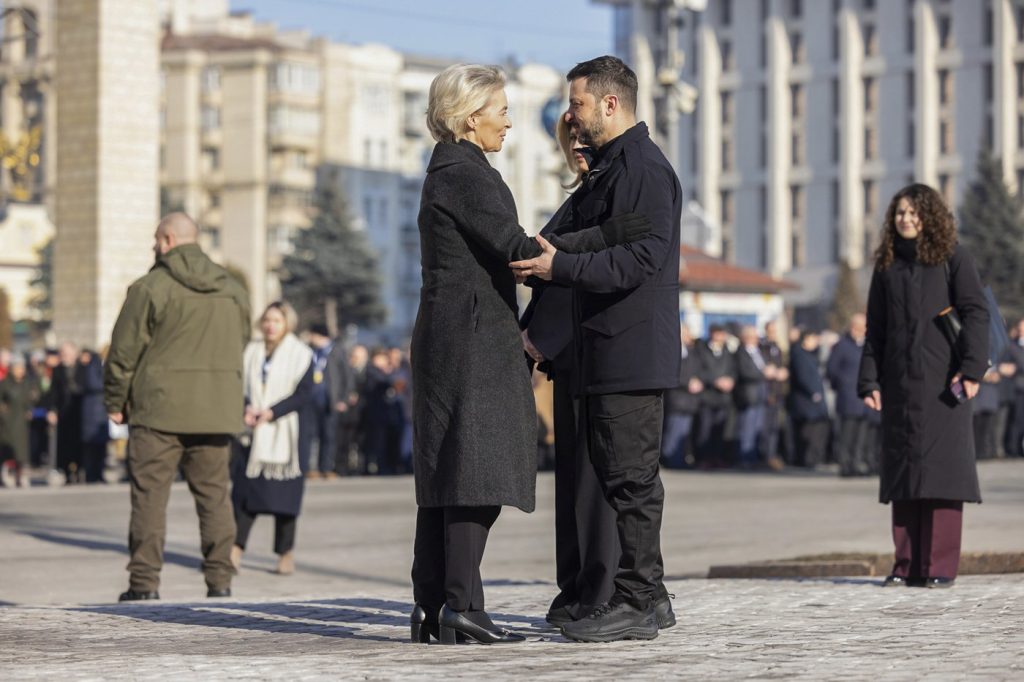KYIV, Ukraine (AP) – Dozens of leaders from Europe and Canada convened in Ukraine's capital to commemorate the third anniversary of Russia's invasion. Among the notable attendees were European Commission President Ursula von der Leyen and Canadian Prime Minister Justin Trudeau, who engaged in discussions with Ukrainian President Volodymyr Zelenskyy regarding ongoing support for Ukraine.
This anniversary comes at a pivotal time as U.S. policies towards Russia and Ukraine are undergoing significant changes under President Donald Trump. The specter of possible peace talks, alongside Ukraine's aspirations for European Union (EU) and NATO membership, remains a critical focus of discussions.
The United Nations General Assembly has adopted a resolution proposed by Ukraine, demanding an immediate withdrawal of all Russian military forces. The vote saw 93 in favor, 18 against, and 65 abstentions, indicating a weakening consensus compared to previous resolutions that commanded broader international support condemning Russia's actions. The resolution was passed ahead of a competing U.S. proposal that sought a swift end to hostilities but failed to explicitly mention Russia's invasion.
In another development, the seven Nordic and Baltic countries announced a commitment to train and equip a brigade of the Ukrainian armed forces, comprising between 3,000 to 5,000 soldiers. Norwegian Prime Minister Jonas Gahr Stoere stated that Norway would also contribute approximately $11.2 million to bolster energy systems in Ukraine and neighboring Moldova.
Ursula von der Leyen lauded Ukraine's advancements toward EU membership, suggesting that the nation could potentially join the bloc before 2030, provided it continues to meet necessary criteria and reforms. However, Russia continues to adamantly oppose Ukraine’s membership in either the EU or NATO.
Discussions on a potential European peacekeeping force were also initiated by Lithuanian Prime Minister Gitanas Nauseda, who emphasized the importance of clarity regarding the mandate for such forces in Ukraine following any potential ceasefire. He advocated for immediate and robust responses to any future violations of peace agreements.
During a virtual G7 summit aimed at ending the conflict, President Zelenskyy appealed to Trump for unwavering U.S. support, highlighting the significance of American assistance for Ukraine's future. He stressed that maintaining a presence for Ukraine in NATO is essential for ensuring its security and stability against future Russian aggression.
Finnish President Alexander Stubb urged European countries to take decisive action in formulating a negotiation strategy for Ukraine, voicing concerns about the transatlantic partnership's recent shifts. He called for a proactive approach from European leaders to ensure their involvement in ongoing negotiations, which he contended are being conducted without adequate planning or strategy.
Zelenskyy reaffirmed the aim of achieving a conclusion to the conflict within the year while outlining the need for robust deterrence measures against future aggression by Russia. He argued that Ukraine's accession to the EU and NATO would significantly strengthen its position and prevent further incursions.
Estonian Prime Minister Kristen Michal warned that an "unjust peace" would set a dangerous precedent for aggressive actors worldwide, indicating that the conflict in Ukraine implicates broader global security. Concurrently, the EU's von der Leyen emphasized that any discussions regarding sanctions relief for Russia would only commence upon Russia's genuine commitment to a meaningful peace agreement.
New sanctions were announced by the UK, targeting 107 businesses and individuals connected to Russia's military supply chain, including wealthy Russian oligarchs and companies providing military support. Sweden and Denmark have also pledged substantial military assistance to Ukraine, reinforcing their support as global efforts to address the conflict continue.
Despite ongoing sanctions and diplomatic pressures, Russian Foreign Minister Sergey Lavrov reiterated the Kremlin's demands for Ukraine's non-accession to NATO as a prerequisite for negotiations. In contrast, Western leaders continue to assert the necessity of Ukraine's sovereignty and territorial integrity in future negotiations.
As the situation develops, the international community remains entrenched in discussions regarding the fate of Ukraine, with varying positions on assistance, sanctions, and peacekeeping efforts underscoring the complexity of navigating the conflict's resolution amidst differing political landscapes.










